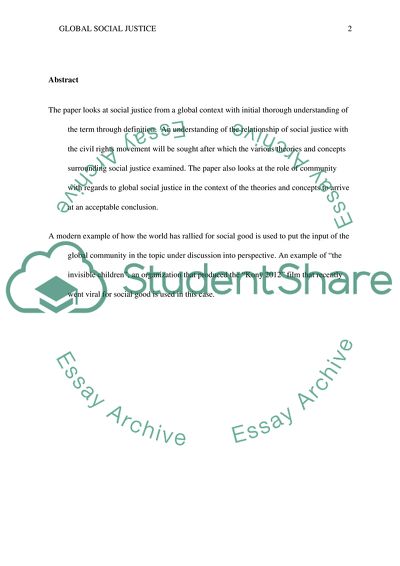Cite this document
(Critically Analyse the Role and Value of 'the Community in Global Justice Theory Essay Example | Topics and Well Written Essays - 3750 words, n.d.)
Critically Analyse the Role and Value of 'the Community in Global Justice Theory Essay Example | Topics and Well Written Essays - 3750 words. https://studentshare.org/history/1772548-critically-analyse-the-role-and-value-of-the-community-in-global-justice-theory-how-can-a-global-community-for-global-social-justice-be-achieved-in-a-world-of-nation-states
Critically Analyse the Role and Value of 'the Community in Global Justice Theory Essay Example | Topics and Well Written Essays - 3750 words. https://studentshare.org/history/1772548-critically-analyse-the-role-and-value-of-the-community-in-global-justice-theory-how-can-a-global-community-for-global-social-justice-be-achieved-in-a-world-of-nation-states
(Critically Analyse the Role and Value of 'The Community in Global Justice Theory Essay Example | Topics and Well Written Essays - 3750 Words)
Critically Analyse the Role and Value of 'The Community in Global Justice Theory Essay Example | Topics and Well Written Essays - 3750 Words. https://studentshare.org/history/1772548-critically-analyse-the-role-and-value-of-the-community-in-global-justice-theory-how-can-a-global-community-for-global-social-justice-be-achieved-in-a-world-of-nation-states.
Critically Analyse the Role and Value of 'The Community in Global Justice Theory Essay Example | Topics and Well Written Essays - 3750 Words. https://studentshare.org/history/1772548-critically-analyse-the-role-and-value-of-the-community-in-global-justice-theory-how-can-a-global-community-for-global-social-justice-be-achieved-in-a-world-of-nation-states.
“Critically Analyse the Role and Value of 'The Community in Global Justice Theory Essay Example | Topics and Well Written Essays - 3750 Words”. https://studentshare.org/history/1772548-critically-analyse-the-role-and-value-of-the-community-in-global-justice-theory-how-can-a-global-community-for-global-social-justice-be-achieved-in-a-world-of-nation-states.


